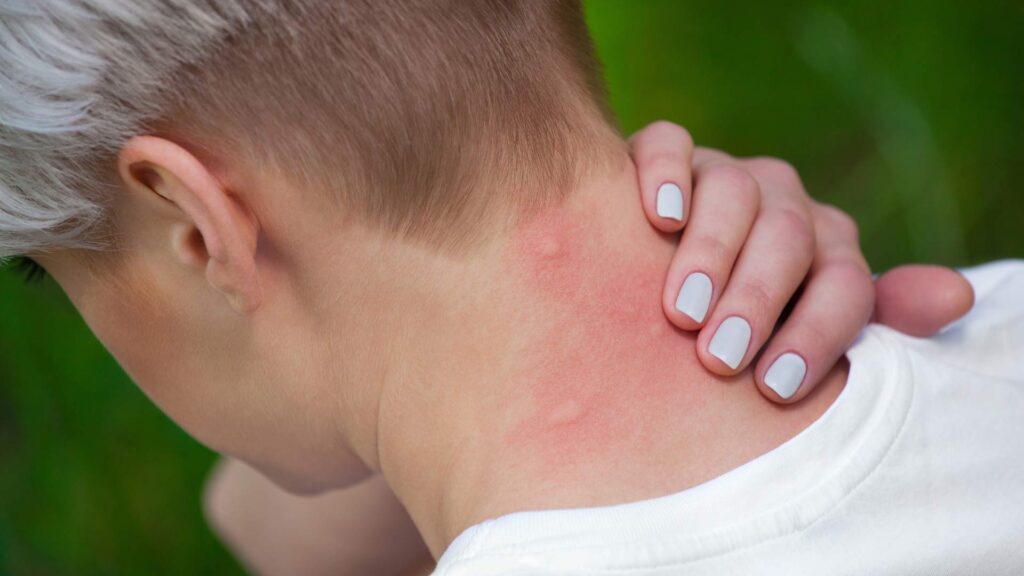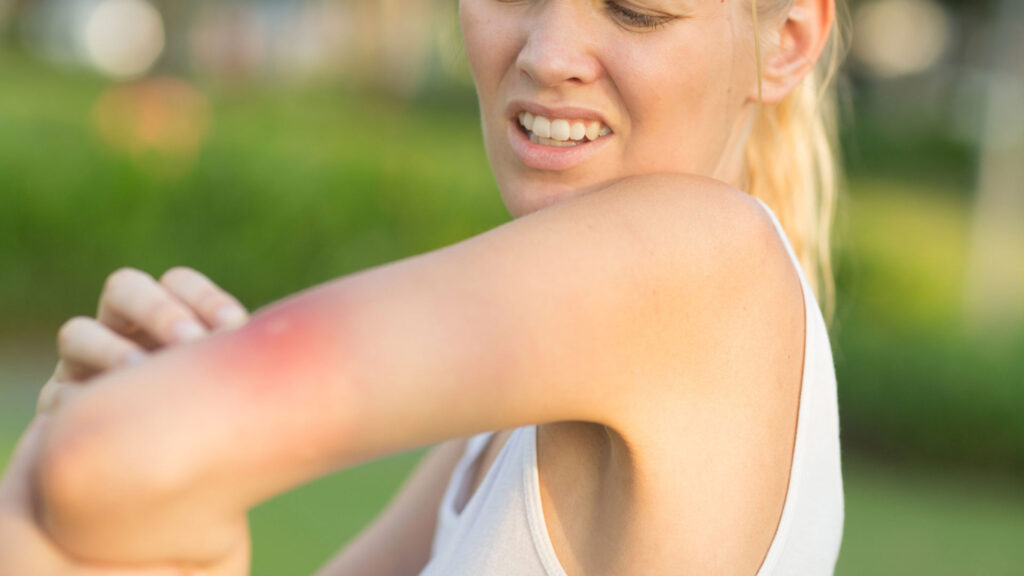Can You Have an Allergic Reaction to Mosquito Bites?
Yes, you can have an allergic reaction to mosquito bites, known as “skeeter syndrome.” This reaction is due to an immune response to the proteins in mosquito saliva, resulting in symptoms like significant swelling, redness, and in severe cases, blistering rashes or anaphylaxis. While most people experience only minor irritation, those with skeeter syndrome, particularly children and individuals with immune system disorders, may face more serious reactions. It’s important to recognize these symptoms and seek medical advice if severe reactions occur.

- The Hidden Threat in a Bite: A Deeper Dive
- A Closer Look at Skeeter Syndrome: Unraveling the Allergic Mystery
- Decoding the Allergic Reaction: A Deeper Dive into the Body’s Response to Mosquito Bites
- The Rising Concern
- Practical Homeowner Advice
- Navigating the New Normal: A Deeper Dive into Mosquito Bite Allergies
- Frequently Asked Questions: Allergic Reactions to Mosquito Bites
In the quiet of a summer evening, as homeowners enjoy the tranquility of their backyards, an uninvited guest often makes its presence known – the mosquito. These ubiquitous insects, often brushed off as mere annoyances, carry with them a lesser-known but significant threat: the potential to cause allergic reactions in certain individuals. This aspect of mosquito interaction, typically overshadowed by concerns of disease transmission, warrants a closer examination, especially in the context of home safety and human health.
Mosquitoes are more than just carriers of diseases like Zika, West Nile, or Malaria; they can also be the source of acute discomfort and health complications for people with sensitivities to their bites. While the majority of the population endures mosquito bites as temporary, albeit bothersome, itchy welts, a segment experiences reactions that are far more severe. These reactions, ranging from intense swelling and soreness to systemic responses, pose a hidden but real danger, particularly in domestic settings where exposure to mosquitoes is common.
The nature of these allergic reactions to mosquito bites is complex and multifaceted. It involves an overreaction of the body’s immune system to the proteins in mosquito saliva. Unlike the more commonly recognized mosquito-borne diseases, the allergic reactions do not stem from pathogens transmitted by the insect but from the body’s response to the bite itself. This distinction is crucial in understanding the risk and in formulating appropriate preventive and treatment strategies.
As we delve deeper into this topic, it’s important to recognize that our changing climate and expanding urban landscapes are altering mosquito habitats and behaviors, potentially leading to increased contact between humans and these insects. This shift necessitates a renewed focus on the implications of mosquito bites, extending beyond disease transmission to include allergic reactions. Homeowners, in particular, must be aware of these risks as they seek to create safe and healthy living environments for their families.
In this article, we will explore the various aspects of allergic reactions to mosquito bites, from the scientific underpinnings to practical advice for homeowners. We will look at case studies, expert opinions, and research data to provide a comprehensive understanding of this often-overlooked health concern. As we navigate through the nuances of this topic, the goal is to equip readers with the knowledge and tools necessary to protect themselves and their loved ones from the hidden dangers lurking in the seemingly innocuous mosquito bite.
The Hidden Threat in a Bite: A Deeper Dive
Mosquito bites are often viewed as a minor inconvenience of outdoor life. However, beneath the surface of these seemingly trivial encounters lies a hidden threat: the potential for severe allergic reactions in certain individuals. This aspect of mosquito bites is frequently overlooked, yet it holds significant implications for health and safety, particularly in residential settings.
When a mosquito pierces the skin, it’s not just taking a blood meal; it’s also injecting saliva into the bloodstream. This saliva contains proteins that most people’s immune systems recognize as harmless. However, in some individuals, these proteins trigger an immune response far beyond the typical itchiness.
The range of allergic reactions to mosquito bites varies greatly. For the majority, a bite results in a small, itchy red bump that disappears within a few days. However, for those with heightened sensitivity, the reaction can be much more severe. This includes extensive swelling, redness, and soreness around the bite site, sometimes expanding far beyond the initial puncture.
Skeeter syndrome, a term used to describe a severe allergic reaction to mosquito bites, is characterized by symptoms that can mimic bacterial infections. These include large, painful swellings, heat around the bite area, and in some cases, accompanying fever and swollen lymph nodes. The severity of these symptoms can be alarming, often leading to unnecessary antibiotic treatments due to misdiagnosis.
Children and individuals with compromised immune systems are particularly susceptible to these severe reactions. In children, the immune system’s heightened response to the unfamiliar proteins in mosquito saliva can result in dramatic symptoms. Similarly, those with immune system disorders may experience exaggerated reactions due to their body’s inability to regulate its response to the mosquito saliva proteins effectively.
One of the challenges with skeeter syndrome is its lack of recognition, even among healthcare professionals. Symptoms are often mistaken for cellulitis or other skin infections, leading to treatments that do not address the underlying allergic reaction. This misunderstanding underscores the need for increased awareness and education about the potential severity of mosquito bite reactions.
The hidden threat in a mosquito bite extends beyond individual health concerns. It poses a broader public health issue, especially as mosquito populations fluctuate and expand due to environmental changes. Understanding the potential severity of reactions to mosquito bites is crucial in developing effective public health strategies and personal preventive measures.
The hidden threat in a mosquito bite is a complex issue that warrants greater attention and understanding. It’s a reminder that even the most common and seemingly insignificant aspects of our environment can have profound implications for our health and well-being.
Understanding and Managing Mosquito Bite Allergies
| Factor | Description | Homeowner Tips |
|---|---|---|
| Identification | Skeeter Syndrome: Allergic reaction to mosquito saliva, characterized by excessive swelling, redness, and sometimes fever. | Visual Inspection: Look for unusually large swelling or redness around bite sites. |
| Risk Groups | Children and individuals with immune system disorders are more susceptible. | Extra Caution: Pay special attention to reactions in these groups and consult a doctor if symptoms are severe. |
| Symptoms | Ranges from mild (large swelling, itching) to severe (blistering rash, anaphylaxis). | Monitor Symptoms: Track the progression and seek medical help if symptoms escalate. |
| Prevention | Eliminating standing water, using window screens, and applying insect repellents. | Regular Checks: Ensure no standing water in the yard and windows are well screened. |
| Treatment | Over-the-counter antihistamines for mild reactions; epinephrine injectors for severe cases. | Preparedness Kit: Keep a first aid kit with necessary medications and know how to use them. |
| Consultation | Seeing an allergist for personalized advice and potential allergy testing. | Professional Advice: Consider an allergist consultation, especially if reactions are recurrent or severe. |
| Awareness | Understanding the rise in mosquito-borne allergies due to environmental changes. | Stay Informed: Keep up with local health advisories and environmental changes that may increase mosquito activity. |
A Closer Look at Skeeter Syndrome: Unraveling the Allergic Mystery
Skeeter syndrome, a term not commonly heard in everyday conversations, represents a significant and often misunderstood allergic reaction to mosquito bites. This condition, while not widely known, can have profound implications for those affected, particularly in how it manifests and the challenges it presents in both diagnosis and management.
What is Skeeter Syndrome?
Skeeter Syndrome is an allergic reaction to the proteins in mosquito saliva. Unlike a normal mosquito bite, which results in a small, itchy welt, those with Skeeter Syndrome experience more severe symptoms. These can include:
- Large areas of swelling
- Redness and heat around the bite
- Pain or tenderness at the bite site
- Blistering rashes
- Fever and swollen lymph nodes (in severe cases)
This condition is more common in children and individuals with compromised immune systems. It is often mistaken for cellulitis or other skin infections due to its severe appearance.
Skeeter syndrome is characterized by an exaggerated immune response to the proteins found in mosquito saliva. Unlike typical mosquito bites that result in small, itchy red bumps, this syndrome can cause alarmingly large areas of swelling, redness, and discomfort. The symptoms can appear immediately after the bite or develop over several hours, often catching individuals off guard.
This allergic reaction is more prevalent in children, who have less exposure to mosquito bites and thus less tolerance built up over time. However, it’s not exclusive to the young; adults with immune system disorders or those who have less frequent exposure to mosquitoes can also be susceptible. The variability in individual immune responses makes predicting who might develop Skeeter syndrome challenging.
The symptoms of Skeeter syndrome go beyond the typical itchiness. They can include:
- Large, inflamed welts at the bite site
- Pain and warmth around the affected area
- Fever and sometimes swollen lymph nodes
- In extreme cases, blistering and bruising
These symptoms can last from a few hours to several days, causing significant discomfort and concern.
One of the biggest challenges with Skeeter syndrome is its diagnosis. Its symptoms can mimic other conditions like cellulitis, a bacterial skin infection, leading to misdiagnosis and inappropriate treatments. Allergists often rely on patient history and a physical examination to diagnose this condition. In some cases, allergy testing may be conducted to confirm sensitivity to mosquito saliva.
Treatment for Skeeter syndrome primarily focuses on symptom relief. Over-the-counter antihistamines can reduce itching and swelling, while ice packs can provide local relief. In more severe cases, physicians may prescribe corticosteroids to reduce inflammation. For those with a history of severe reactions, carrying an epinephrine injector might be recommended.
Prevention plays a crucial role in managing Skeeter syndrome. Reducing mosquito exposure through environmental control (like eliminating standing water), using insect repellents, and wearing protective clothing can significantly lower the chances of being bitten.
As mosquito populations grow and spread, partly due to climate change, the incidence of Skeeter syndrome may increase. This underscores the importance of public awareness and healthcare preparedness in addressing this allergic reaction.
Skeeter syndrome, while not a common household term, represents a significant health concern for those affected. Understanding its symptoms, risks, and management strategies is crucial for timely diagnosis and treatment. As our interactions with the natural world evolve, recognizing and responding to such conditions becomes an essential part of our collective health and well-being.
The Thompson Family’s Encounter with Skeeter Syndrome
The Thompsons, a family residing in a suburban neighborhood known for its lush greenery and ponds, faced an unexpected health scare that brought to light the seriousness of mosquito-borne allergies. Their eight-year-old son, Alex, was an active child who loved playing outdoors. One summer evening, after spending time in their backyard, Alex developed what appeared to be a typical mosquito bite on his arm. However, within hours, the site swelled abnormally, engulfing his entire forearm, accompanied by intense itching and discomfort. Concerned, his parents sought medical help, believing it to be a severe skin infection.
At the local clinic, Alex was initially treated for a bacterial infection. However, when antibiotics failed to reduce the swelling and his condition worsened, further investigation revealed the true culprit: skeeter syndrome. This diagnosis came as a shock to the Thompsons, who had never heard of such a reaction to mosquito bites. The family learned that Alex’s immune system had overreacted to the proteins in the mosquito’s saliva, causing an exaggerated inflammatory response. Treatment with corticosteroids and antihistamines gradually alleviated his symptoms, but the incident left a lasting impact on the family. They became advocates for awareness about mosquito bite allergies, emphasizing the importance of recognizing symptoms and seeking timely medical advice. The Thompsons also implemented preventive measures at home, such as installing screens on windows and doors, using mosquito repellents, and ensuring their yard was free from standing water, to safeguard their family against future mosquito encounters.
Decoding the Allergic Reaction: A Deeper Dive into the Body’s Response to Mosquito Bites
When a mosquito pierces the skin, it’s not just taking a blood meal; it’s also introducing its saliva into our bloodstream. This saliva, a complex mixture of proteins, is an essential part of the mosquito’s feeding process, as it contains anticoagulants that prevent blood from clotting. However, for some individuals, this saliva triggers an immune response far beyond the typical itchiness.
Dr. Jane H. Smith, an expert in allergology and immunology, sheds light on this process. “The immune system is designed to protect us from foreign substances, but in some cases, it can overreact. When a mosquito bites, certain proteins in its saliva are seen as invaders, leading the immune system to defend the body.”
This defense mechanism involves the release of histamine, a compound that increases blood flow and white blood cell count around the affected area. Histamine is responsible for the redness, swelling, and itching commonly associated with mosquito bites.
Not everyone’s immune system reacts the same way to mosquito saliva. “Some people have a higher sensitivity, which can lead to more pronounced symptoms,” explains Dr. Smith. This heightened sensitivity can result in larger, more painful welts, intense itching, and in severe cases, systemic reactions.
The proteins in mosquito saliva act as allergens for those with skeeter syndrome. These allergens bind to IgE antibodies, a type of antibody associated with allergic reactions. This binding triggers the release of histamine and other inflammatory substances from mast cells, a type of immune cell.
Research suggests that both genetic and environmental factors play a role in determining who develops an allergic reaction to mosquito bites. Some people may be genetically predisposed to react more strongly to mosquito saliva, while repeated exposure can also increase sensitivity.
The severity of reactions can vary widely. For most, it’s a minor annoyance, but for others, especially those with skeeter syndrome, it can lead to more severe symptoms like extensive swelling, blistering, and, in rare cases, anaphylaxis.
Understanding the immune response to mosquito bites is crucial for developing effective treatments. For mild cases, over-the-counter antihistamines and topical creams can alleviate symptoms. However, for those with severe reactions, more aggressive treatments, such as corticosteroids or epinephrine, may be necessary.
The allergic reaction to mosquito bites is a complex interplay between the immune system and the proteins in mosquito saliva. While most people experience only minor symptoms, a subset with heightened sensitivity can face significant discomfort and health risks. Awareness and appropriate treatment are key to managing these reactions, especially in areas with high mosquito activity.
The Rising Concern
The concern over mosquito-borne allergies is escalating, not just as a matter of individual health, but as a public health issue. Climate change plays a pivotal role in this trend. Warmer temperatures and changing rainfall patterns are expanding mosquito habitats, leading to increased mosquito populations in areas previously unaffected. This expansion is not just limited to rural or traditionally mosquito-prone areas; urban environments are also seeing a rise in mosquito activity. A study in the ‘Environmental Health Perspectives’ journal indicates that urbanization, with its heat islands and pockets of stagnant water, creates ideal breeding grounds for mosquitoes, inadvertently bringing the risk closer to more people.
Moreover, the globalization of travel and trade introduces new mosquito species to different regions, some of which may carry unique allergens in their saliva. This increases the likelihood of individuals encountering mosquito species they haven’t been exposed to before, potentially triggering allergic reactions. Public health experts are concerned about the lack of widespread knowledge and preparedness for these reactions. While mosquito-borne diseases like malaria and dengue have received considerable attention, the allergic reactions caused by mosquito bites, though less severe, are often overlooked in public health discussions. This oversight can lead to a lack of resources and information for those at risk, particularly in densely populated urban areas where mosquitoes are becoming more prevalent.
As we face these evolving challenges, the need for public awareness and education becomes more critical. Homeowners and communities must be informed about the risks and the simple yet effective measures they can take to protect themselves. This includes not only personal protective measures but also community-wide efforts to control mosquito populations and monitor changes in mosquito behavior due to environmental factors. The rising concern over mosquito-borne allergies is a call to action for both individuals and public health systems to adapt and prepare for these changing environmental and health landscapes.
Practical Homeowner Advice
For homeowners, the battle against mosquitoes and the potential for allergic reactions begins with proactive measures. The first line of defense is environmental control. Eliminating breeding grounds is crucial; this means regularly draining any standing water in items like bird baths, old tires, and plant saucers. Ensuring proper yard maintenance, such as trimming tall grass and bushes where mosquitoes thrive, can also reduce their presence. Additionally, using outdoor fans on patios and decks can help, as mosquitoes are weak fliers and often avoid windy areas.
Inside the home, physical barriers are effective. Installing and maintaining window and door screens can significantly reduce the entry of mosquitoes. For added protection, especially in bedrooms, mosquito nets around beds can be used, particularly in areas where mosquito-borne diseases are prevalent. When it comes to personal protection, the use of EPA-registered insect repellents containing DEET, Picaridin, or oil of lemon eucalyptus is recommended. These should be applied according to the manufacturer’s instructions for effective and safe use. For those with sensitive skin or allergies, natural repellents or mosquito-repellent clothing might be preferable options.
Awareness and preparedness are key. Homeowners should educate themselves about the signs of an allergic reaction to mosquito bites. Keeping a first-aid kit with topical antihistamines and oral allergy medication can provide quick relief from mild symptoms. For those with a history of severe reactions, consulting with a healthcare provider for a prescription of an epinephrine auto-injector is advisable. Regularly checking local health department updates for mosquito activity and disease outbreaks can also help in staying informed and prepared for peak mosquito seasons. Through these comprehensive strategies, homeowners can effectively reduce the risk and impact of mosquito bites and potential allergic reactions.
Navigating the New Normal: A Deeper Dive into Mosquito Bite Allergies
As we grapple with the evolving challenges posed by mosquitoes in our homes and communities, it becomes increasingly clear that awareness and preparedness are not just beneficial—they are essential. The conclusion of this discussion on mosquito bite allergies is not merely a call to action but a roadmap for navigating a landscape where these insects are more than a seasonal nuisance; they are a perennial health concern.
The rise in allergic reactions to mosquito bites isn’t an isolated phenomenon. It’s a part of a larger narrative about environmental changes and their impact on public health. As global temperatures rise and ecosystems shift, mosquitoes are finding new habitats, bringing them into closer contact with human populations. This change isn’t just increasing the frequency of bites; it’s potentially exposing more people to allergens they haven’t previously encountered.
Homeowners play a crucial role in this narrative. By taking proactive measures to control mosquito populations around their homes, they can significantly reduce the risk of bites for themselves and their communities. This involves more than just eliminating standing water or installing screens. It’s about cultivating an awareness of how everyday actions—from the way we manage our gardens to the products we use—can influence mosquito habitats.
For individuals, particularly those with known allergies or immune system concerns, personal vigilance is paramount. This means not only using repellents and protective clothing but also being aware of the symptoms of an allergic reaction. Early recognition and treatment can prevent a simple bite from escalating into a more serious health issue.
There’s also a pressing need for community education and resources. Local health departments, schools, and community organizations can play a pivotal role in disseminating information about mosquito-borne allergies and prevention strategies. This includes providing resources for those who may not have easy access to repellents, screens, or medical care.
There’s a need for ongoing research and informed policy. As we learn more about the nature of mosquito-borne allergies and the impact of environmental changes, policies must adapt to address these challenges. This could mean investing in research, supporting public health initiatives, or reevaluating how we approach mosquito control at both the local and national levels.
The issue of allergic reactions to mosquito bites is a multifaceted challenge that extends beyond the individual to encompass broader environmental, public health, and policy concerns. As we continue to navigate this changing landscape, a combined effort of awareness, personal responsibility, community action, and policy adaptation will be crucial in managing the risks and ensuring the health and safety of our homes and communities.
Frequently Asked Questions: Allergic Reactions to Mosquito Bites
Can mosquito bites cause allergic reactions?
Yes, some individuals can have allergic reactions to mosquito bites. This condition, often referred to as “skeeter syndrome,” involves an overreaction of the immune system to the proteins in mosquito saliva.
What are the symptoms of an allergic reaction to mosquito bites?
Symptoms can range from large, swollen areas around the bite to fever, hives, and in severe cases, anaphylaxis. Common signs include excessive redness, swelling, pain, and sometimes blistering.
Is skeeter syndrome common?
Skeeter syndrome is relatively uncommon and is more frequently observed in children and individuals with immune system disorders. However, it is often underdiagnosed or misdiagnosed.
How can I tell if it’s a mosquito bite allergy or a normal reaction?
A normal mosquito bite typically results in a small, itchy red bump. An allergic reaction is usually more severe, with larger swelling, intense itching, and pain. If you’re unsure, it’s best to consult a healthcare professional.
Are certain people more at risk for mosquito bite allergies?
Yes, children, individuals with immune system disorders, and those who have had limited exposure to mosquitoes (and thus less immunity to their saliva) are at higher risk.
How can I prevent mosquito bites at home?
Eliminate standing water where mosquitoes breed, use window screens and bed nets, and apply mosquito repellents. Wearing long sleeves and pants during peak mosquito hours can also help.
What treatments are available for mosquito bite allergies?
Over-the-counter antihistamines can alleviate symptoms. In more severe cases, a doctor may prescribe corticosteroids or recommend an epinephrine injector for those at risk of anaphylaxis.
Should I see a doctor for a mosquito bite?
If you experience symptoms of an allergic reaction, such as significant swelling, fever, or difficulty breathing, seek medical attention immediately.
Can mosquito bite allergies be cured?
While there’s no cure for the allergy itself, symptoms can be managed with proper treatment and preventive measures.
How does climate change affect mosquito bite allergies?
Climate change can expand mosquito habitats and extend their breeding seasons, potentially increasing the frequency of bites and, consequently, allergic reactions. This underscores the importance of awareness and preventive measures in affected areas.




